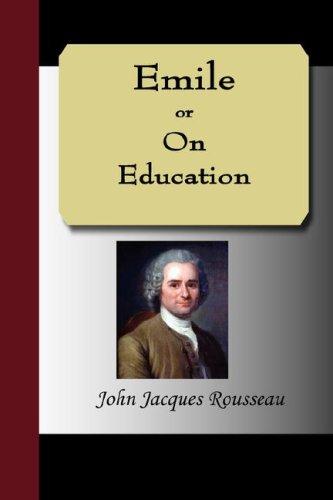Émile or On Education: Strategic Insights for Modern Professionals
Jean-Jacques Rousseau’s “Émile or On Education” is a seminal work that delves into the philosophy of education and human development. Although originally written in the 18th century, its themes are timeless, offering profound insights applicable to today’s professional landscape. This summary reinterprets Rousseau’s ideas, drawing parallels with contemporary challenges in professional development, leadership, and digital transformation.
The Foundation of Personal Development
Rousseau begins by emphasizing the importance of natural education, which respects the individual’s innate tendencies and the natural progression of learning. In a professional context, this translates to personalized development plans that align with an individual’s strengths and interests. Modern organizations can implement this by fostering a culture of continuous learning, where employees are encouraged to pursue skills and knowledge that resonate with their personal and professional goals.
Embracing the Growth Mindset
Rousseau’s advocacy for learning through experience rather than rote memorization parallels the contemporary concept of a growth mindset, as championed in Carol Dweck’s book, “Mindset: The New Psychology of Success.” Both Rousseau and Dweck emphasize the importance of viewing challenges as opportunities for growth. In today’s rapidly changing business environment, adaptability and resilience are key, echoing the sentiments found in “The Lean Startup” by Eric Ries, where the ability to pivot and iterate is essential for success.
Core Frameworks and Concepts
Natural Education
Rousseau’s framework for natural education is structured around the idea of allowing nature to guide the learning process. This approach is broken down into several key stages:
- Infancy: Focus on physical development and sensory exploration.
- Childhood: Encourage curiosity and hands-on learning.
- Adolescence: Develop critical thinking and moral reasoning.
- Young Adulthood: Foster independence and social responsibility.
These stages align with modern educational theories, such as Maria Montessori’s emphasis on self-directed learning and Howard Gardner’s theory of multiple intelligences, suggesting that education should be tailored to individual strengths and preferences.
Real-World Application
To illustrate Rousseau’s concept of natural education in a contemporary setting, consider a corporate training program that allows employees to choose their learning paths based on personal interests and career goals. For instance, a tech company might offer workshops on emerging technologies, providing hands-on experiences that mirror Rousseau’s principles of learning through doing.
Personalized Development Plans
Employers can draw on Rousseau’s insights to create development plans that focus on individual strengths. By conducting regular assessments and feedback sessions, organizations can identify employees’ unique talents and align their roles and responsibilities accordingly. This approach not only enhances employee satisfaction but also boosts productivity and innovation.
Integration with Modern Tools
The rise of digital learning platforms has made it easier to implement Rousseau’s educational philosophies. Tools like personalized dashboards and AI-driven course recommendations enable learners to pursue knowledge at their own pace, fostering a sense of autonomy and motivation.
Key Themes
1. The Role of Nature in Learning
Rousseau’s belief in the natural progression of learning suggests that education should be closely aligned with the learner’s environment. This theme is evident in modern outdoor education programs and experiential learning initiatives, which emphasize the importance of engaging with the natural world to foster cognitive and emotional development.
2. Emotional Intelligence and Leadership
Rousseau’s exploration of emotional intelligence (EI) as a critical component of education resonates with Daniel Goleman’s work, “Emotional Intelligence: Why It Can Matter More Than IQ.” Both authors highlight the importance of empathy, self-awareness, and social skills in effective leadership. Leaders who cultivate EI can create more cohesive and motivated teams, ultimately driving organizational success.
3. Ethical Decision-Making
Rousseau’s emphasis on ethical decision-making is particularly relevant in today’s business ethics discussions. Leaders are encouraged to consider the broader impact of their decisions, aligning them with both organizational values and societal good. This aligns with Stephen R. Covey’s “The 7 Habits of Highly Effective People,” which underscores the importance of principled leadership.
4. Innovation and Agility
The capacity for innovation and agility in a rapidly evolving digital world is a key theme in Rousseau’s work. By fostering a culture of experimentation, organizations can remain competitive and adapt to change. This is akin to the agile methodologies described in “Scrum: The Art of Doing Twice the Work in Half the Time” by Jeff Sutherland.
5. Education as a Catalyst for Societal Change
Rousseau viewed education as a means to transform society, a concept that resonates with the modern idea of corporate social responsibility (CSR). Organizations today are expected to contribute positively to society, using their resources and influence to drive social change. This aligns with the principles outlined in “Let My People Go Surfing” by Yvon Chouinard, which advocates for sustainable business practices and ethical entrepreneurship.
Final Reflection and Application
Jean-Jacques Rousseau’s “Émile or On Education” offers a wealth of insights that remain relevant to today’s professionals. By embracing the principles of personalized development, emotional intelligence, innovation, and social responsibility, organizations can navigate the complexities of the modern business landscape.
Rousseau’s work encourages us to view education as a lifelong journey, integral to personal and professional growth, and essential for driving meaningful change in our organizations and society. In a world increasingly driven by technology and rapid innovation, Rousseau’s emphasis on natural learning and ethical leadership provides a framework for balancing progress with humanity.
The synthesis of Rousseau’s ideas with those of modern thinkers like Carol Dweck, Daniel Goleman, and Eric Ries reveals a comprehensive approach to education and leadership. By integrating these insights into professional development strategies, leaders can cultivate environments that are both innovative and ethically grounded.
Ultimately, the application of Rousseau’s philosophies extends beyond traditional education, influencing domains such as leadership, design, and change management. By fostering a culture of continuous learning and ethical decision-making, organizations can not only thrive in the present but also contribute to a more equitable and sustainable future.

